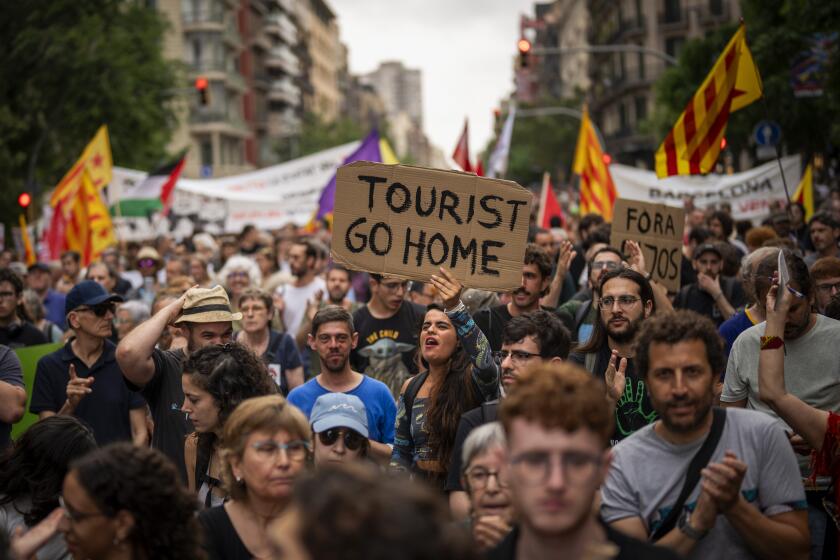Frost Predicted for President’s Visit to London
As a rancher most comfortable in cowboy boots and blue jeans, President Bush may not be looking forward to donning formal wear at a Buckingham Palace banquet this week -- an event likely to be documented in widely circulated photographs.
For the image-conscious Bush White House, such pictures may be the least of its worries.
During the president’s state visit to the United Kingdom, which begins Tuesday, tens of thousands of Britons plan to take to the streets to register their vociferous disapproval of Bush and the Iraq war. At Trafalgar Square, they will topple a Bush effigy in an act reminiscent of the leveling of Saddam Hussein’s statue in downtown Baghdad in April.
In a sign of Bush’s unpopularity in parts of Europe -- and in a country that he regards as enjoying a “special relationship” with America -- much of the traditional pomp that accompanies a state visit has been stripped from the president’s public schedule. There will be no picturesque horse-drawn carriage ride with Queen Elizabeth II down the Mall. Missing, too, is an address to Parliament.
The president is not oblivious to the frosty reception that lurks beyond the official bubble that will surround him throughout his three-day visit.
In an interview with British journalists this week, Bush playfully predicted that not all Britons waving at him in the coming days would be doing so “with all five fingers.”
Yet images of a besieged U.S. president in London -- the capital of America’s steadiest ally -- would be no laughing matter, said some analysts, who warned that antiwar protests there might further energize opposition to Bush’s Iraq policy at home, where doubts about his handling of the war already are growing.
“I don’t see how this trip helps President Bush any,” said Stephen Hess, a senior political analyst at the Brookings Institution in Washington.
Fred I. Greenstein, a presidential scholar at Princeton University, said the trip “could even embolden the guerrillas in Iraq. They’ve got satellite TV too.”
Greenstein said, “My guess is, the trip will prove of less use for Karl Rove [the president’s chief political strategist] than for Howard Dean,” the front-runner for the Democratic presidential nomination who has been highly critical of the Iraq war.
With as many as 100,000 demonstrators expected to join in the anti-Bush rallies, authorities in London have canceled all police vacations amid spirited debate over security arrangements -- specifically, how close the protesters will be allowed to get to such sites as Buckingham Palace, where the president and First Lady Laura Bush will be staying.
If the predicted numbers of antiwar activists materialize, they will form the largest demonstrations that Bush will have encountered while on foreign soil. Previously, protesters have gathered when Bush and other world leaders held global trade conferences, such as in Genoa, Italy, in July 2001 and in Kananaskis, Canada, in June 2002. But those demonstrations involved hundreds or at best several thousand protesters.
If large antiwar demonstrations took place in France or Germany, two nations that strongly opposed the Iraq war, they would probably only strengthen Bush’s standing at home.
“But in Britain, a strong ally, with no reflexive anti-Americanism, those pictures [of massive anti-Bush demonstrations] could matter” -- and might erode Bush’s standing at home, political analyst Stuart Rothenberg said.
“I don’t think it’s going to change opinions, but it could make some Republicans at least uncomfortable,” he said.
Bush is the 11th U.S. president to be invited to Britain by the queen. Her only other state visitor this year was Russian President Vladimir V. Putin, who was there in June.
Bush will find himself in a country whose citizens harbor great doubts about his Iraq policy. A recent Times of London survey found that 60% of the British public disapproved of Bush’s handling of the Iraq war. Only 20% approved. Forty percent approved of Prime Minister Tony Blair’s unstinting support of Bush’s decision to invade Iraq.
“A lot of people feel we got drawn into a war that wasn’t necessary, and lives have been lost,” one British analyst said.
But Bush appeared undaunted by such sentiments.
“I am so pleased to be going to a country which says that people are allowed to express their mind. That’s fantastic. Freedom is a beautiful thing. And the fact that people are willing to come out and express themselves says I’m going to a great country,” he told reporters at the White House on Thursday. “I don’t expect everybody in the world to agree with the positions I’ve taken. But certainly, those should agree with the goals of the United States, which is peace and freedom.”
In his only address during the state visit, Bush plans to speak Wednesday about the future of the transatlantic alliance while lauding the U.S.-British friendship.
“The depth of the special relationship between our two countries cannot be overstated,” said Condoleezza Rice, the White House national security advisor. “The United States has no greater friend.”
Bush also is to meet with British soldiers who served in Afghanistan and Iraq, as well as with selected family members of those who died there. He said he would share with them his own “deep grief, my sorrow,” but also tell them that “their loved ones did not die in vain.”
The president’s only expected real encounter with ordinary citizens will come during a visit to Blair’s home district, when a few of the prime minister’s constituents will join the leaders for lunch.
More to Read
Sign up for Essential California
The most important California stories and recommendations in your inbox every morning.
You may occasionally receive promotional content from the Los Angeles Times.










